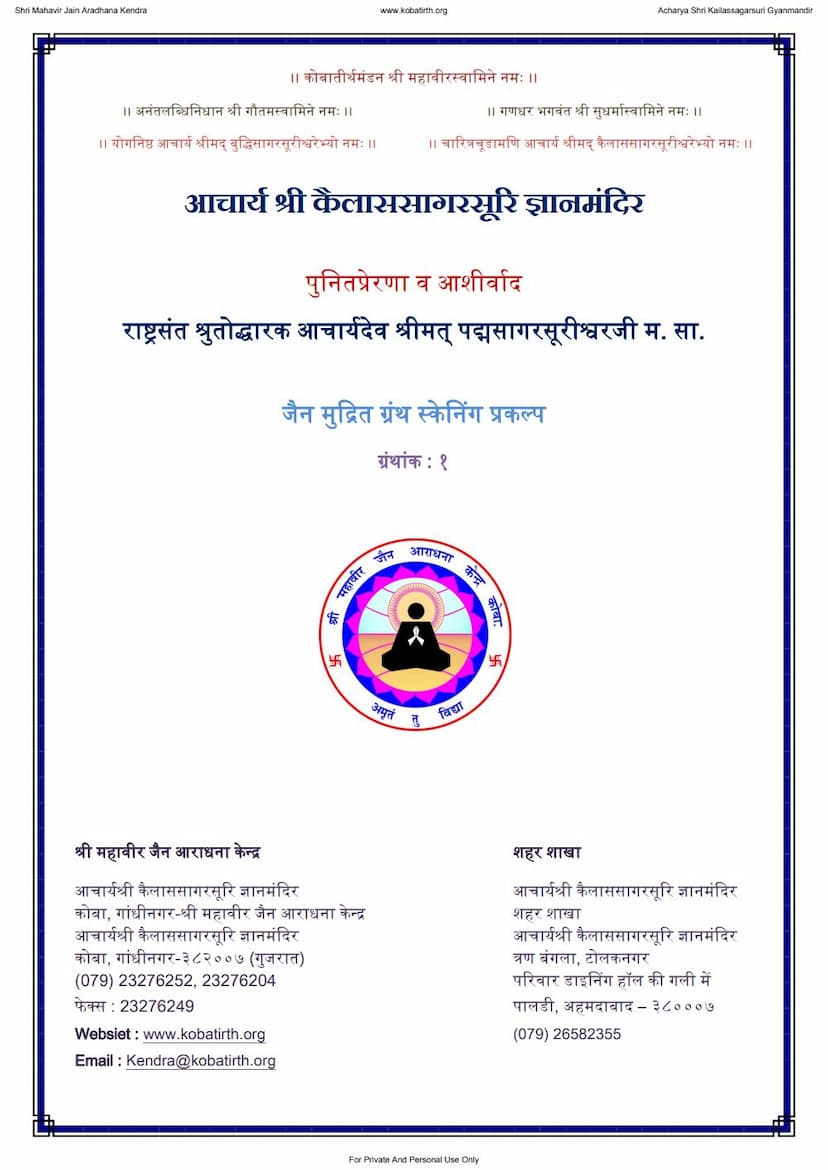Anusandhan Swarup Evam Pravidhi
Added to library: September 1, 2025

Summary
The book "Anusandhan: Swaroop evam Pravidhi" (Research: Nature and Method) by Dr. Ramgopal Sharma 'Dinesh', published by Rajasthan Hindi Granth Academy in 1994, is a comprehensive guide to research methodologies, particularly focusing on the humanities.
The book addresses a significant gap in Hindi literature by providing a structured and accessible overview of research principles applicable across various humanities disciplines. The author emphasizes that research is not merely about acquiring degrees or gaining fame, but a continuous process of seeking truth and contributing to human welfare.
Key themes and structure of the book include:
-
Definition and Objectives of Research: The book begins by defining research as a rigorous, systematic, and disciplined inquiry aimed at discovering new facts, interpretations, or theories, or revising existing ones. It highlights that research is an unending quest to dispel ignorance and expand knowledge for the betterment of humanity. The ultimate goal is to make knowledge useful and applicable to human life.
-
Types of Research: Dr. Sharma outlines several types of research, including:
- Original Research (Maulik Shodh): This involves creating entirely new knowledge or discoveries.
- Historical Research (Aitihasik Shodh): This focuses on investigating past events and human activities using scientific methods.
- Value-based Research (Mulya-parak Shodh): This type of research explores the values present within specific historical periods or cultural artifacts.
- Explanatory Research (Vyakhyaatmak Shodh): This involves interpreting existing knowledge to provide new insights or refutations.
- Survey Research (Sarvekshanatmak Shodh): This method involves gathering data through surveys and questionnaires to understand trends, opinions, or facts within a specific population or context.
- Experimental Research (Prayogaatmak Shodh): Primarily used in sciences and psychology, this involves controlled experiments to test hypotheses.
- Compilation Research (Sankalanatmak Shodh): This type focuses on collecting and analyzing data to draw conclusions, often employing statistical methods.
-
Research Methodologies (Anusandhan ki Pravidhiyan): The book delves into various research methods and their appropriate applications. It critiques common methodological pitfalls, such as the uncritical adoption of Western approaches, over-reliance on personal interpretation (subjectivity), and the tendency to substitute criticism for rigorous research. The author stresses the importance of a systematic approach, data collection, analysis, and objective interpretation. Specific methodologies discussed include:
- Divisive Traditional Method
- Introvert Psychic Perception Method
- Philosophical Method
- Psychoanalytic Method
- Experimental Psychological Method
- Sociological Method
- Multifaceted Cognitive Method
- Stylistic Methods (Literary, Perceptual, Scientific, Experimental)
-
Research in Humanities (Manaviki Vishayon mein Anusandhan): A significant portion of the book is dedicated to understanding research within the humanities disciplines like languages, literature, history, and philosophy. The author explains how these fields, unlike sciences, often rely on interpretation, textual analysis, and understanding human experiences rather than empirical experiments. He highlights the interconnectedness of humanities disciplines, where literature draws from history and philosophy, and vice versa.
-
Specific Methodologies for Disciplines:
- History: Emphasizes the critical analysis of primary and secondary sources, consideration of cultural context, and the need for objectivity.
- Philosophy: Focuses on logical reasoning, textual analysis, understanding different schools of thought, and the importance of philosophical arguments and evidence.
- Fine Arts (Painting, Music, Dance): Discusses the role of aesthetic appreciation, historical context, technical analysis, and the influence of cultural and philosophical ideas.
- Linguistics: Details methods for language analysis, including phonetic studies, dialectology, historical linguistics, and lexicography.
- Literary Research and Criticism: Differentiates between literary research (investigating facts, authorship, historical context) and criticism (evaluating literary merit and meaning). It stresses the importance of textual criticism (pathalochan) for accurate interpretation.
- Manuscript Editing (Pandulipi-Sampadan): Explains the meticulous process of analyzing, comparing, and establishing the authentic text of old manuscripts, recognizing it as both an art and a science.
- Comparative Research: Highlights the value of comparing texts, authors, literary trends, or linguistic features across cultures and languages to identify similarities, differences, and influences.
- Lexicography (Shabdkosh-Nirman): Outlines the systematic process of collecting, defining, and organizing words, emphasizing the need for thorough fieldwork and accurate etymological and semantic analysis.
- Research and Human Values: Underscores the ethical responsibility of researchers to uphold human values, contribute to social welfare, and avoid biases or agendas that could undermine truth or harm society.
- Research Proposal and Thesis Writing: Provides guidance on structuring a research proposal, conducting the research, analyzing findings, and writing a coherent and well-supported thesis.
- Hindi Research: Development, Achievements, and Suggestions: Offers a retrospective analysis of Hindi research, identifying its strengths, weaknesses, and areas for future development, with a detailed case study of research on Tulsidas.
The book emphasizes that regardless of the discipline, research should be characterized by rigor, objectivity, a deep understanding of the subject matter, and a commitment to contributing meaningful knowledge. Dr. Sharma's work serves as a foundational text for aspiring researchers in the humanities in the Hindi-speaking academic landscape.